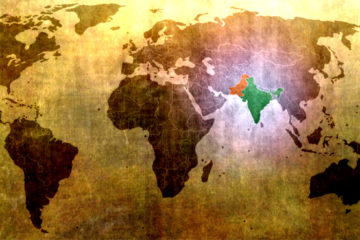The New ‘Worldmakers’: How the 20th Century Black Anticolonial Dialogue Reveals the Strategic Importance of the Milk Tea Alliance
Growing tension in Berlin. A proxy war in Korea. The escalating Space Race. The world—and particularly its realists—focused on the evolving great power competition between the United States and Soviet Union during the Cold War. However, in the shadows of this marquee battle, black leaders such as Kwame Nkumrah, Eric Williams, and George Padmore drove an anticolonial dialogue that sought to transform the international order on their own accord. Their core mission: to reframe sovereignty, reconceptualising it as self-determination and the elimination of racial hierarchy. This weighty conversation, which took place from the 1950s to the 1980s, doesn’t seem related to an Asian meme war in 2020. However, amidst a new, growing Cold War between the U.S. and China, the ‘Milk Tea Alliance’ has emerged as the newest supranational …
Britain-China relations: Is Coronavirus a turning point?
The past five years have been deemed a “Golden Era” in Britain-China relations, with the two countries promoting bilateral trade and investments. However, as the Coronavirus pandemic marches on, this relationship seems to be souring. Voices in Britain, especially in Conservative environments, have raised need to rethink or reset the nation’s relationship with China, who is accused of misinforming and mismanaging the pandemic. While Coronavirus is exacerbating tensions, it would though be incorrect to blame it fully for the chill in relations. A distancing from China was already occurring prior to the pandemic. The foundations of the “Golden Era” were established during the Conservatives’ return to government in 2010. Chinese investments in the United Kingdom were seen as a key source …
Covid-19: Will US World Power Continue On?
It has become a recurrent point for commentators to propose that we are living in the remnants of an old and dying world order with a new one waiting to take over. Namely, they predict that the US and the West is on the verge of losing its global hegemony to Asia. Even before Covid-19, many predicted that a Chinese-led world order was imminent, as evidenced by a photo in 2018 of US-China trade discussions. Philosopher Antonio Gramsci described such a period as an interregnum where “a great variety of morbid symptoms appear.” The divergent world responses to Covid-19 have been viewed as evidence of these symptoms. Commentators have continuously compared the inertness of Western governments with the efficiency of China, South …
The Ineffective International Response to the Rohingya Crisis ─ A Paradox
The longstanding Rohingya crisis in Myanmar has generated massive human rights violations, becoming a humanitarian disaster. It is not only an internal matter for Myanmar, as it has destabilized the regional tranquility of South and Southeast Asia and triggered a global outcry. In this article, I will illustrate why major states, such as China, India, Russia, and the US, have adopted a policy of overlooking the Rohingya crisis. I have intentionally excluded the potential for a prominent leadership role from the already fragile Muslim world because of both their general absence from the central world leadership and their preoccupation with their own domestic crises. The Rohingya are the largest community among eight prominent Muslim groups in Myanmar and have lived in its Rakhine State (formerly Arakan) for generations. They are envisaged by the nation’s government and Buddhist population as illegal Bengali immigrants who came from what is …
The Importance of Changing Hukou Status for Better Spatial Equalities in China
From 2016 to 2020, China has been carrying a five-year project of hukou reform, granting urban hukous to rural-to-urban migrants. The hukou system was initiated in 1958 to control the movement of the Chinese population. Each Chinese citizen is assigned either a rural or urban hukou, depending on their residency. It is noteworthy that Chinese citizens cannot hold both a rural and urban hukou simultaneously. This has caused major problems for the estimated 262 million rural workers in urban areas nationwide. The five-year project has sought to convert rural hukous to urban ones to help rural Chinese to succeed in urban areas. As the project comes to an end, it is important to analyse whether hukou conversion – loosening the requirements to change a rural hukou to urban hukou – is conducive to rural Chinese citizens’ educational and social success, …

Why more needs to be done to defend internet access
On November 17th, 2019, Iran cut out access to the internet. This meant that the Iranian government could repress protests over increased gas prices without making much news. Reportedly, 180 people were killed in the process, yet people were mostly unable to share information about the repressive acts of the government. This is only one recent case of hundreds of governmental internet blackouts that have been performed in 2019. At present, countries are facing very little consequences for shutting down their citizens’ access to the internet. In a world where the internet is playing an increasingly important role both in daily life and political contestation, very little is being done to safeguard access to the internet. What is needed is a serious shift in …
Hong Kong: Have Protester Demographics Changed Following Escalating Violence?
As protests in Hong Kong have become more violent, have the demographics of the protesters changed? Political scientists have argued that a shift toward more violent protest action can alienate moderate protesters. Moderates, in this definition, are those who may share common cause with radicals (or those who embrace violent tactics) but reject those tactics. Once alienated, such moderate protesters tend to withdraw their support from a movement and may refrain from participating in protest action in the future. Hong Kong’s protests seem to have defied this trend. My surveys of protest participants find that the demographic profile of protesters has remained relatively constant even as violence has escalated in the demonstrations. Certain types of protesters who might be expected …

Prolonging Conflict: Global Powers’ Involvement in the India-Pakistan Rivalry
The India-Pakistan conflict is one of the most enduring rivalries of the post-World War era. The two nuclear states have fought four wars, and smaller-scale skirmishes are common occurrences. Since the nuclearization of the two countries in 1998, the nuclear stalemate has been one of the most important facet of this ongoing rivalry. Apart from Kashmir, over which three wars have been fought, constant cross-border terrorist attacks in India have severely limited and disrupted initiatives to defuse the situation. Recently, tensions have flared up because of the decision by the Indian government to abrogate Article 370 of the constitution which gave the state of Jammu and Kashmir special status within the Indian republic. This move has infuriated Pakistan, vowing to …









